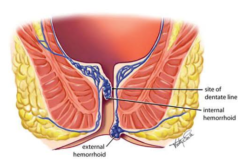
Hemorrhoids, a common health condition found in both men and women, often are the source of discomfort and worry. While this condition is generally harmless and manageable with lifestyle changes and over-the-counter treatments, there are instances where surgical intervention might be required. This guide aims to provide an in-depth understanding of the symptoms associated with hemorrhoids and discuss scenarios where surgery could be a consideration. By shedding light on this topic, we hope to demystify the fear associated with hemorrhoids and encourage informed health decisions.
Grasping the Basics of Hemorrhoids
Hemorrhoids are swollen veins in the lower rectum or anus, often resulting from increased pressure in the area. They can be internal or external and vary in severity. Understanding the symptoms is crucial for effective management and determining when medical intervention, such as surgery, might be necessary. Some common symptoms include rectal pain, itching, and bleeding during bowel movements. Other signs may include discomfort or pressure in the anal area, as well as swelling or lumps near the anus. In some cases, hemorrhoids can also cause fecal leakage or difficulty with cleaning after a bowel movement.
Symptoms of Hemorrhoids: Knowing What to Look For
The symptoms of hemorrhoids include discomfort, itching, pain, and bleeding around the rectal area, especially during bowel movements. External hemorrhoids might be felt as a lump near the anus, which can be sensitive or painful. Internal hemorrhoids, though not always felt, can cause bleeding during bowel movements without associated pain. In general, the symptoms of hemorrhoids can vary from person to person depending on factors such as severity, location, and individual health.
Complications of Hemorrhoids: Recognizing More Serious Signs
In some cases, hemorrhoids can lead to complications like anemia from chronic blood loss, prolapsed hemorrhoids, or thrombosed hemorrhoids, where a blood clot forms. These situations require prompt medical attention. If you experience severe pain, fever, or difficulty with bowel movements, it is important to consult a doctor immediately. These signs may indicate a more serious condition that requires medical intervention.
When to Consider Surgery for Hemorrhoids
Surgery for hemorrhoids, known as a hemorrhoidectomy or hemorrhoid stapling, is considered when other treatments such as lifestyle changes, medications, and minimally invasive procedures have not provided relief or if the hemorrhoids are particularly large, painful, or prone to bleeding. In general, surgery is reserved as a last resort for severe cases of hemorrhoids.
Understanding Hemorrhoid Surgery: Procedures and Outcomes
Hemorrhoid surgery is generally an outpatient procedure. Hemorrhoidectomy involves the removal of excess tissue causing bleeding, while stapling is used for prolapsed hemorrhoids. Both aim to alleviate symptoms and improve quality of life. Surgery may result in some discomfort or pain during recovery, but most patients find relief from their symptoms and improved overall health.
Preventing Hemorrhoids: Tips for a Healthy Lifestyle
While surgery may be necessary in some cases, there are measures you can take to prevent hemorrhoids from developing or worsening. These include maintaining a healthy weight, staying hydrated, avoiding straining during bowel movements, and incorporating fiber-rich foods into your diet. It may also be helpful to avoid prolonged sitting or standing and take breaks to move around.
Recovery After Hemorrhoid Surgery: What to Expect
Recovery time can vary, but patients may experience pain and discomfort for a few weeks after the surgery. Pain management, sitz baths, and stool softeners are often recommended during the recovery period. It's essential to follow post-surgery instructions to prevent complications and ensure proper healing.
Lifestyle Modifications: Preventing Hemorrhoid Recurrence Post-Surgery
Post-surgery, adopting lifestyle changes is crucial to prevent the recurrence of hemorrhoids. This includes maintaining a high-fiber diet, staying hydrated, exercising regularly, and avoiding straining during bowel movements. Additionally, practicing good hygiene and avoiding sitting for extended periods can also help prevent hemorrhoid recurrence.
Conclusion: Making an Informed Decision About Hemorrhoid Surgery
While the decision to undergo surgery for hemorrhoids is personal and should be made in consultation with a healthcare professional, understanding the symptoms and treatment options can guide patients in making an informed choice. With proper care and lifestyle adjustments, it is possible to find relief from hemorrhoid symptoms and improve overall rectal health.
